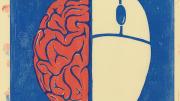Google and other search engines have changed the way we use the Internet, putting vast sources of information just a few clicks away. But Lindsley professor of psychology Daniel Wegner’s recent research proves that websites—and the Internet—are changing much more than technology itself. They are changing the way our memories function.
Wegner’s latest study, “Google Effects on Memory: Cognitive Consequences of Having Information at Our Fingertips,” shows that when people have access to search engines, they remember fewer facts and less information because they know they can rely on “search” as a readily available shortcut.
Wegner, the senior author of the study, believes the new findings show that the Internet has become part of a transactive memory source, a method by which our brains compartmentalize information. First hypothesized by Wegner in 1985, transactive memory exists in many forms, as when a husband relies on his wife to remember a relative’s birthday. “[It is] this whole network of memory where you don’t have to remember everything in the world yourself,” he says. “You just have to remember who knows it.” Now computers and technology as well are becoming virtual extensions of our memory.
The idea validates habits already forming in our daily lives. Cell phones have become the primary location for phone numbers. GPS devices in cars remove the need to memorize directions. Wegner points out that we never have to stretch our memories too far to remember the name of an obscure movie actor or the capital of Kyrgyzstan—we just type our questions into Google. “We become part of the Internet in a way,” he says. “We become part of the system and we end up trusting it.”
Working with researchers Betsy Sparrow of Columbia and Jenny Liu of the University of Wisconsin-Madison, Wegner conducted four experiments to demonstrate the phenomenon, using various forms of memory recall to test reliance on computers. (The results were published in the August 5 issue of Science.) In the first experiment, participants demonstrated that they were more likely to think of computer terms like “Yahoo” or “Google” after being asked a set of difficult trivia questions. In two other experiments, participants were asked to type a collection of readily memorable statements, such as “An ostrich’s eye is bigger than its brain.” Half the subjects were told that their work would be saved to a computer; the other half were informed that the statements would be erased. In subsequent memory testing, participants who were told their work would not be saved were best at recalling the statements. In a fourth experiment, participants typed into a computer statements they were told would be saved in specific folders. Next, they were asked to recall the statements. Finally, they were given cues to the wording and asked to name the folders where the statements were stored. The participants proved better able to recall the folder locations than the statements themselves.
Wegner concedes that questions remain about whether dependence on computers will affect memories negatively: “Nobody knows now what the effects are of these tools on logical thinking.” Students who have trouble remembering distinct facts, for example, may struggle to employ those facts in critical thinking. But he believes that the situation overall is beneficial, likening dependence on computers to dependence on a mechanical hand or other prosthetic device, or to the use of calculators in the classroom. Initially, math students were banned from using the latter, he points out, but “Now it’s gotten to the point where most of the time we are being tested with our calculators, to see where we can get with that wonderful tool in our hands.”
And even though we may not be taxing our memories to recall distinct facts, we are still using them to consider where the facts are located and how to access them. “We still have to remember things,” Wegner explains. “We’re just remembering a different range of things.” He believes his study will lead to further research into understanding computer dependence, and looks forward to tracing the extent of human interdependence with the computer world—pinpointing the “movable dividing line between us and our computers in cyber networks.”









